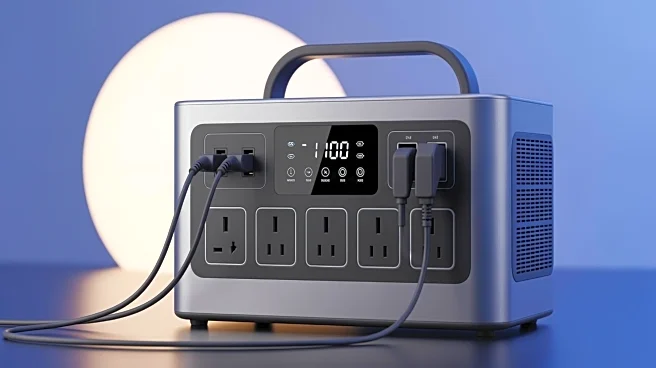What's Happening?
Anker has reduced the price of its Solix C1000 Gen 2 power station to $398, marking its lowest price yet. This portable power station offers 2,000 watts of output, ultrafast charging, and smart app control,
making it suitable for home use, travel, and emergencies. The device features a HyperFlash system that recharges the station in 49 minutes and supports solar charging in under two hours. With a 1,024 watt-hour LiFePO4 battery rated for 10 years of daily use, the Solix C1000 Gen 2 can power up to 10 devices simultaneously, providing reliable energy without overspending.
Why It's Important?
The price reduction of Anker's Solix C1000 Gen 2 power station makes reliable backup power more accessible to consumers, particularly in times of power outages or when off the grid. This affordability could encourage more households to invest in emergency power solutions, enhancing preparedness for natural disasters or infrastructure failures. The power station's portability and efficiency also make it appealing for outdoor enthusiasts and those living in areas prone to power disruptions. As energy independence becomes increasingly important, products like the Solix C1000 Gen 2 contribute to a growing market for sustainable and reliable power solutions.
What's Next?
With the Solix C1000 Gen 2's competitive pricing, Anker may see increased demand for its power stations, potentially leading to expanded product offerings or enhancements in future models. Consumers might explore additional portable power solutions, driving innovation in the sector. As more households adopt backup power systems, there could be a shift towards greater energy resilience and self-sufficiency. Anker's pricing strategy may also influence competitors to offer similar discounts, benefiting consumers with more options.
Beyond the Headlines
The affordability of Anker's Solix C1000 Gen 2 power station highlights broader trends in the energy sector, including the push for renewable energy solutions and the democratization of technology. As consumers seek sustainable alternatives, companies may face pressure to innovate and reduce costs further. The integration of smart app control in power stations reflects the growing importance of connectivity and user-friendly interfaces in tech products, potentially influencing future developments in home energy management systems.










